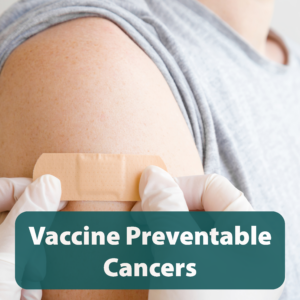Increase Hepatitis B Virus (HBV) and Human Papillomavirus (HPV) Vaccination Uptake
 The Priority
The Priority
Hepatitis B virus (HBV) and human papillomavirus (HPV) are two viruses with known associations to several cancers. Many liver cancer cases are related to the hepatitis B virus. Similarly, persistent HPV infection can cause multiple types of cancer, including cervical, vulvar, vaginal, penile, or anal as well as a collection of cancers in the mouth or throat known as oropharyngeal cancer. There are safe, effective vaccines for both HBV and HPV, which have been shown to substantially reduce the risk of the associated cancers.
The hepatitis B vaccine is safe and effective against hepatitis B, can lower liver cancer risk, and is recommended for all infants and unvaccinated children, adults 19 through 59 years of age, and adults 60 years of age and older with risk factors for hepatitis B infection. Adults 60 years of age and older without known risk factors for hepatitis B infection may receive hepatitis B vaccines. Cancer coalitions can work with partners to improve access to HBV vaccination for adults; increase knowledge and awareness of viral hepatitis and liver cancer in the community and among healthcare providers; work with partners to improve delivery of viral hepatitis services; and conduct disease surveillance. Learn more about specific strategies to addressing viral hepatitis-related liver cancer.
HPV vaccination provides safe, effective, and long-lasting protection against cancers caused by HPV. Routine vaccination against HPV is recommended at age 11 or 12 years and for everyone through age 26 years if not adequately vaccinated previously. Comprehensive cancer control (CCC) coalitions can work with partners to review surveillance data and identify local disparities in HPV vaccination and HPV-associated cancers; educate communities about HPV vaccination as cancer prevention; and support provider networks and health systems to reduce missed opportunities for vaccination.
What We Do
The Comprehensive Cancer Control National Partnership (CCCNP) is focused on providing technical assistance and capacity-building for CCC coalitions to increase HBV and HPV vaccination and reduce vaccine-preventable cancers.
In 2014, the National Partnership began supporting coalitions to increase the HPV vaccination rates among 11- to 12-year-olds across the U.S. The HPV work group started by identifying and mapping the multiple partner activities related to HPV vaccination, which allowed the work group to identify opportunities for collaboration. Between 2016-2018, the work group supported 33 state teams by bringing them together for in-person workshops to learn about proven, evidence-based strategies and participate in dedicated time to develop collaborative, one-year action plans to increase vaccine uptake. Post-workshop technical assistance was provided to help state teams with implementation of the action plan and to continue sharing evidence-based strategies and resources. In 2019, the National Partnership expanded our focus to include vaccine-preventable liver cancer and the promotion of HBV vaccination.
Through webinars and developing resources, the vaccine-preventable cancers work group will work to increase awareness among CCC coalitions about HBV and liver cancer and HBV vaccination interventions. We also aim to support CCC coalitions in using data to identify disparities in vaccine preventable cancers and vaccination rates and provide guidance on evaluating HBV and HPV coalition activities.
Resources
The vaccine preventable cancers workgroup of the Comprehensive Cancer Control National Partnership (CCCNP) has developed an evaluation resource to help CCC coalitions to evaluate their efforts in promoting Hepatitis B (HBV) and human papillomavirus (HPV) vaccination. This resource has been developed to evaluate the areas of partnership enhancement and communication that CCC coalitions are likely to focus on in promoting HPV and HBV vaccination.
The Centers for Disease Control and Prevention (CDC) provides HPV resources and HBV resources for parents and the public, health care professionals, partners and programs.
The National Cancer Institute (NCI) hosts the Evidence-Based Cancer Control Programs (EBCCP) website, searchable database of evidence-based cancer control programs that provides program planners and public health practitioners easy and immediate access to:
- programs tested in a research study,
- publication(s) of the study findings, and
- program materials used with a particular study population in a specific setting.
- National HPV Vaccination Roundtable (HPV Roundtable), convened by the American Cancer Society, is a trusted coalition of public, private, and voluntary organizations and experts dedicated to reducing incidence of and mortality from HPV cancers in the United States and curates a helpful
- resource library for various audiences (parents, clinicians, state, and local coalitions) involved in similar efforts.
Hep B United is the only national coalition dedicated to address and eliminate hepatitis B and associated liver cancer. They offer resources for organizations like webinars, fact sheets, communications resources, and more.
Download a PDF of the CCCNP’s HBV Resource List to distribute to your partners.
CCCNP Cancer Conversation – Hepatitis B Screening for Cancer Prevention: An Update on the New Screening Recommendations
